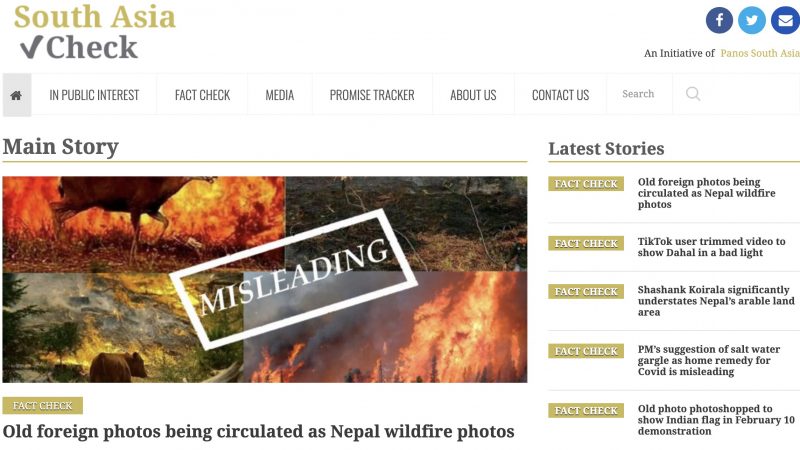By Sanjib Chaudhary, for Global Voices
From exposing the misleading social media photos about the recent wildfires to discrediting COVID-19 hoaxes, the South Asia Check group has been actively challenging the spread of disinformation in Nepal.
Officially launched on 9 September 2015, the group is an independent, non-partisan, non-profit initiative committed to battling the circulation of disinformation on social media and other online platforms.
In an interview with Global Voices, South Asia Check editor Deepak Adhikari highlighted the importance of fact-checking:
There’s a tendency to cherry-pick facts and present them to suit a particular agenda. Politicians, bureaucrats, business leaders, public intellectuals and others tend to make unsubstantiated and false claims. They often mislead people. So, our job is to present accurate information to the public. We practice journalism in the public interest. Fact-checking is needed to debunk falsehood and help people get accurate and evidence-based information.
This role was recently affirmed when the group debunked the widely shared photos of the wildfires that engulfed Nepal.
Kathmandu, the capital city of Nepal, saw an unprecedented rise in pollution level in the last week of March 2021. Experts attributed the rise in pollution to the wildfires engulfing the forests and the smoke arising from them.
While people flooded the social channels with news, information, images and videos of wildfire, some shared old photos from other countries to highlight the situation. South Asia Check fact-checked the pictures and found them misleading and sourced from the forest fires in the US, Canada, and Indonesia.
The air quality index (AQI), crossed 600 on 26 March – 20 times above the safety level recommended by the World Health Organization. The AQI used to be below 150 even in the most polluted afternoons during this time of the year.
The high level of the AQI was attributed to hundreds of wildfires burning across Nepal, which sent smokes and ashes to localities. An unusually dry winter with only 15% of the normal precipitation in January and February aggravated the wildfire situation in March which destroyed over 700 hectares of forest.
South Asia Check noted that Nepalis resorted to Twitter and Facebook to draw the world’s attention to the wildfires. The #PrayforNepal hashtag trended on Twitter for several days in Nepal, but some of the photos of wildfires shared on social media were misleading and inaccurate.

Image from Unsplash created by Ruth Burrows. Submitted for United Nations Global Call Out To Creatives – help stop the spread of COVID-19.
This is not the first time that South Asia Check conducted a major fact-checking campaign. The year 2020 was significant for the team which actively demystified hoaxes and “fake news” related to the coronavirus pandemic.
“The spread of the virus opened up a floodgate of misinformation,” said Deepak Adhikari. “And, it wasn’t surprising because conspiracy theories and falsehoods thrive in an environment of uncertainty.”
Focusing on the misinformation related to COVID-19 in the beginning, they debunked the news on World Doctor’s Alliance’s video, a purported government text message about snap curfew, claims that COVID-19 test kits predated the pandemic, the Nepali prime minister’s claim about WHO guidelines on COVID-19 deaths verification, an old India toilet photo circulating as a photo of a coronavirus hospital in Nepal, and WHO revising coronavirus risk level for Nepal among others.
In Nepal, the National Penal (Code) Act 2017 prohibits the spread of rumors and any person committing it or causing to commit it can be sentenced to a term not exceeding one year or fined not exceeding ten thousand Nepali rupees (85.2 US dollars) or can be both sentenced and fined.
Responding to the rampant spread of misinformation related to COVID-19, Nepal Police headquarters urged the public not to spread fake news about COVID-19 on social media.
Nepal Fact Check is another initiative that was launched on April 2, 2020. Both South Asia Check and Nepal Fact Check have been fact-checking information circulating in social media as well as news published in media in Nepal.
However, fact-checkers alone can’t check all information circulating online. Readers too can use simple techniques to confirm the validity of news and images before liking or retweeting the content, and helping them go viral.
By Sanjib Chaudhary, for Global Voices





